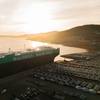Report on Napoli Beaching Incident
On Nov. 6, The Maritime and Coastguard Agency delivered its in-depth 103 page Report to the Chairman of Devons local Inquiry into the circumstances leading to the beaching of the MSC Napoli off the East Devon coastline.
The Report summarises the Agencys activities from the moment the incident broke on the18th January 2007, when the MSC Napoli was on passage in the English Channel, loaded with 2,318 containers and bound for South Africa and when she suffered a catastrophic hull failure and got into severe difficulties.
A number of possible locations were assessed by both the French and British authorities for a place of refuge on both sides of the Channel; however, the south coast of England provided better options for a place of refuge. The conclusion was that the least environmentally risky option was to tow the vessel to a place of refuge in UK waters.
Working with the French authorities, the Secretary of States Representative for Maritime Salvage and Intervention (SOSREP) decided that the ship was in danger of breaking up and polluting the English Channel and should be towed to Portland Harbor.
The SOSREP consulted with local authorities and environmental bodies to the fullest extent possible within the time available. With the condition of the ship deteriorating rapidly, it was necessary for the salvors and the SOSREP to make a fast decision in order to avert a potential environmental catastrophe.
During towing, the weather deteriorated and the salvors and the SOSREP decided to beach the ship in Lyme Bay to minimize the pollution threat.
The MSC Napoli was beached in Lyme Bay on 20 January 2007. Over the next six months the 3,500 tonnes of fuel oil and the containers were systematically removed. The final container was removed on 17 May 2007. Explosives were used to split the MSC NAPOLI into two sections. On 20 July, the ship was successfully split into two pieces and the bow section was towed a short distance away.
The bow section of MSC NAPOLI was removed from Lyme Bay and taken to Harland and Wolffs dismantling facility in Belfast in mid-August 2007. The remaining stern section was left in situ in Lyme Bay, to be cut up and taken away to a recycling facility.
Toby Stone, Head of the Agencys Counter Pollution Unit said, “The successful way in which the MSC NAPOLI was handled demonstrates the effectiveness of the UKs arrangements for handling incidents at sea and the professionalism of all of those involved.”
“We also hope that our submission to the Inquiry will set the record straight on several issues, including of course, the overriding practical reasons for beaching the vessel at Branscombe, and the function of a Shoreline Response Centre. In this case there was no need for such a Centre to co-ordinate the shoreline clean-up operation because the third party insurers retained the services of contractors to do the necessary clean-up work.”
The finalized report will not only be published for general consumption but is intended also to form the Governments contribution to Devon County Councils MSC Napoli Public Inquiry, for which public hearings started on 3 November 2008 and will finish on 7 November 2008.
The report is a factual account of the response to the incident, with conclusions, lessons learned and recommendations. In addition to the response by the MCA, it includes coverage of the actions of other relevant authorities.
(Source: The Maritime & Coastguard Agency Press Office)












